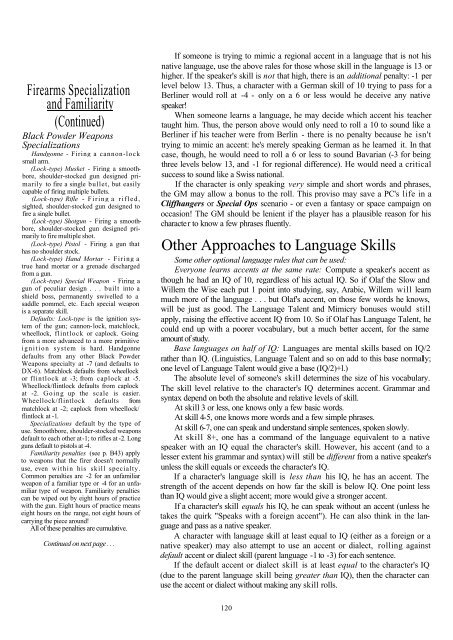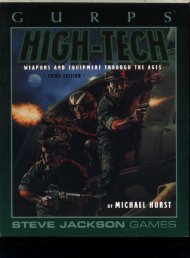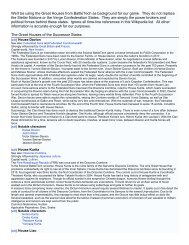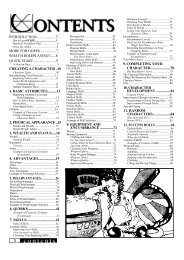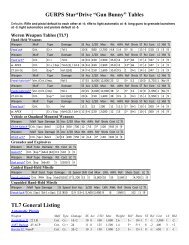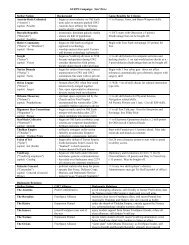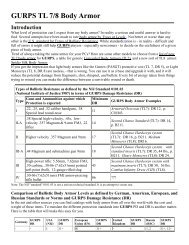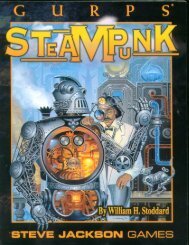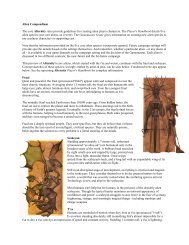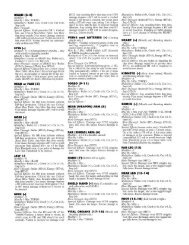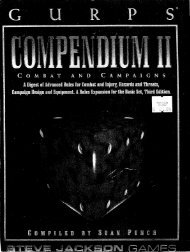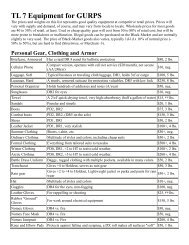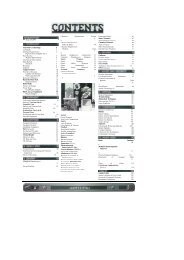GURPS - Compendium 1..
GURPS - Compendium 1..
GURPS - Compendium 1..
Create successful ePaper yourself
Turn your PDF publications into a flip-book with our unique Google optimized e-Paper software.
Firearms Specialization<br />
and Familiarity<br />
(Continued)<br />
Black Powder Weapons<br />
Specializations<br />
Handgonne - Firing a cannon-lock<br />
small arm.<br />
(Lock-type) Musket - Firing a smoothbore,<br />
shoulder-stocked gun designed primarily<br />
to fire a single bullet, but easily<br />
capable of firing multiple bullets.<br />
(Lock-type) Rifle - Firing a rifled,<br />
sighted, shoulder-stocked gun designed to<br />
fire a single bullet.<br />
(Lock -type) Shotgun - Firing a smoothbore,<br />
shoulder-stocked gun designed primarily<br />
to fire multiple shot.<br />
(Lock-type) Pistol - Firing a gun that<br />
has no shoulder stock.<br />
(Lock-type) Hand Mortar - Firing a<br />
true hand mortar or a grenade discharged<br />
from a gun.<br />
(Lock-type) Special Weapon - Firing a<br />
gun of peculiar design . . . built into a<br />
shield boss, permanently swivelled to a<br />
saddle pommel, etc. Each special weapon<br />
is a separate skill.<br />
Defaults: Lock-type is the ignition system<br />
of the gun; cannon-lock, matchlock,<br />
wheellock, flintlock or caplock. Going<br />
from a more advanced to a more primitive<br />
ignition system is hard. Handgonne<br />
defaults from any other Black Powder<br />
Weapons specialty at -7 (and defaults to<br />
DX-6). Matchlock defaults from wheellock<br />
or flintlock at -3; from caplock at -5.<br />
Wheellock/flintlock defaults from caplock<br />
at -2. Going up the scale is easier.<br />
Wheellock/flintlock defaults from<br />
matchlock at -2; caplock from wheellock/<br />
flintlock at -<strong>1.</strong><br />
Specializations default by the type of<br />
use. Smoothbore, shoulder-stocked weapons<br />
default to each other at -1; to rifles at -2. Long<br />
guns default to pistols at -4.<br />
Familiarity penalties (see p. B43) apply<br />
to weapons that the firer doesn't normally<br />
use, even within his skill specialty.<br />
Common penalties are -2 for an unfamiliar<br />
weapon of a familiar type or -4 for an unfamiliar<br />
type of weapon. Familiarity penalties<br />
can be wiped out by eight hours of practice<br />
with the gun. Eight hours of practice means<br />
eight hours on the range, not eight hours of<br />
carrying the piece around!<br />
All of these penalties are cumulative.<br />
Continued on next page . . .<br />
If someone is trying to mimic a regional accent in a language that is not his<br />
native language, use the above rales for those whose skill in the language is 13 or<br />
higher. If the speaker's skill is not that high, there is an additional penalty: -1 per<br />
level below 13. Thus, a character with a German skill of 10 trying to pass for a<br />
Berliner would roll at -4 - only on a 6 or less would he deceive any native<br />
speaker!<br />
When someone learns a language, he may decide which accent his teacher<br />
taught him. Thus, the person above would only need to roll a 10 to sound like a<br />
Berliner if his teacher were from Berlin - there is no penalty because he isn't<br />
trying to mimic an accent: he's merely speaking German as he learned it. In that<br />
case, though, he would need to roll a 6 or less to sound Bavarian (-3 for being<br />
three levels below 13, and -1 for regional difference). He would need a critical<br />
success to sound like a Swiss national.<br />
If the character is only speaking very simple and short words and phrases,<br />
the GM may allow a bonus to the roll. This proviso may save a PC's life in a<br />
Cliffhangers or Special Ops scenario - or even a fantasy or space campaign on<br />
occasion! The GM should be lenient if the player has a plausible reason for his<br />
character to know a few phrases fluently.<br />
Other Approaches to Language Skills<br />
Some other optional language rules that can be used:<br />
Everyone learns accents at the same rate: Compute a speaker's accent as<br />
though he had an IQ of 10, regardless of his actual IQ. So if Olaf the Slow and<br />
Willem the Wise each put 1 point into studying, say, Arabic, Willem will learn<br />
much more of the language . . . but Olaf's accent, on those few words he knows,<br />
will be just as good. The Language Talent and Mimicry bonuses would still<br />
apply, raising the effective accent IQ from 10. So if Olaf has Language Talent, he<br />
could end up with a poorer vocabulary, but a much better accent, for the same<br />
amount of study.<br />
Base languages on half of IQ: Languages are mental skills based on IQ/2<br />
rather than IQ. (Linguistics, Language Talent and so on add to this base normally;<br />
one level of Language Talent would give a base (IQ/2)+l.)<br />
The absolute level of someone's skill determines the size of his vocabulary.<br />
The skill level relative to the character's IQ determines accent. Grammar and<br />
syntax depend on both the absolute and relative levels of skill.<br />
At skill 3 or less, one knows only a few basic words.<br />
At skill 4-5, one knows more words and a few simple phrases.<br />
At skill 6-7, one can speak and understand simple sentences, spoken slowly.<br />
At skill 8+, one has a command of the language equivalent to a native<br />
speaker with an IQ equal the character's skill. However, his accent (and to a<br />
lesser extent his grammar and syntax) will still be different from a native speaker's<br />
unless the skill equals or exceeds the character's IQ.<br />
If a character's language skill is less than his IQ, he has an accent. The<br />
strength of the accent depends on how far the skill is below IQ. One point less<br />
than IQ would give a slight accent; more would give a stronger accent.<br />
If a character's skill equals his IQ, he can speak without an accent (unless he<br />
takes the quirk "Speaks with a foreign accent"). He can also think in the language<br />
and pass as a native speaker.<br />
A character with language skill at least equal to IQ (either as a foreign or a<br />
native speaker) may also attempt to use an accent or dialect, rolling against<br />
default accent or dialect skill (parent language -1 to -3) for each sentence.<br />
If the default accent or dialect skill is at least equal to the character's IQ<br />
(due to the parent language skill being greater than IQ), then the character can<br />
use the accent or dialect without making any skill rolls.<br />
120


